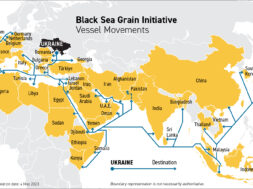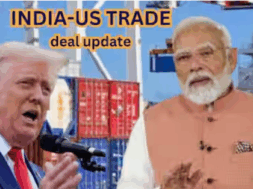
Roving Periscope: Plunging world in food crisis, Russia exits UN-brokered Ukraine grain deal
Virendra Pandit
New Delhi: Pushing many countries into a possible food crisis, Russia on Monday exited the United Nations-brokered Black Sea Agreement that had opened up a passage from the war-ravaged Ukraine for the export of its food grain in July 2022 for a year.
Before Russia’s invasion of Ukraine on February 24, 2022, the two neighboring countries, known as the “foodgrain basket,” accounted for a fourth of the world’s foodgrain exports worth about USD 130 billion, and many countries, especially in Europe, depended on it.
With Russia backing out of the deal, hectic efforts to avert a global food crisis have failed for now, the media reported.
The Kremlin spokesman Dmitry Peskov told reporters on a conference call that the Black Sea Agreements, which allowed the export of Ukrainian grain had “ceased to be valid today.”
The development came hours after Moscow accused Kyiv of attacking the Crimean Bridge that links Russia with this peninsula it had annexed in 2014.
Russia, however, said that their decision had nothing to do with the bridge attack which killed two people and wounded their daughter.
“The Black Sea Agreements ceased to be valid today. Unfortunately, the part of these agreements concerning Russia has not been implemented so far, so its effect is terminated,” Peskov said.
The now-expired deal was brokered by the United Nations and Turkey last July and allowed the safe export of Ukrainian grain blocked by the prolonged conflict. It was extended time and again even as Russia insisted for several months that conditions for its continuation had not been fulfilled.
The Black Sea Grain Initiative had reportedly allowed the export of 36.2 million tons of food from Ukraine since August 2022. More than half of this was sent to developing countries, including those getting relief from the World Food Program.
Kyiv has often been dubbed the ‘breadbasket of the world’ and the suspension of agreements is likely to prompt a spike in food prices, at least in the short run. Interrupted shipments in the early days of the war, for instance, had exacerbated a global food crisis and sent grain prices soaring worldwide.
Citing the International Rescue Committee, the media reported that the grain deal is a “lifeline for the 79 countries and 349 million people on the frontlines of food insecurity.” As climate change wreaks havoc across continents and destroys crops, many countries have become greatly dependent on imported food.
“You will have a new spike for sure (if the deal isn’t renewed). The duration of that spike will depend a lot on how markets will respond,” UN Food and Agriculture Organization chief economist Maximo Torero was quoted as saying.














